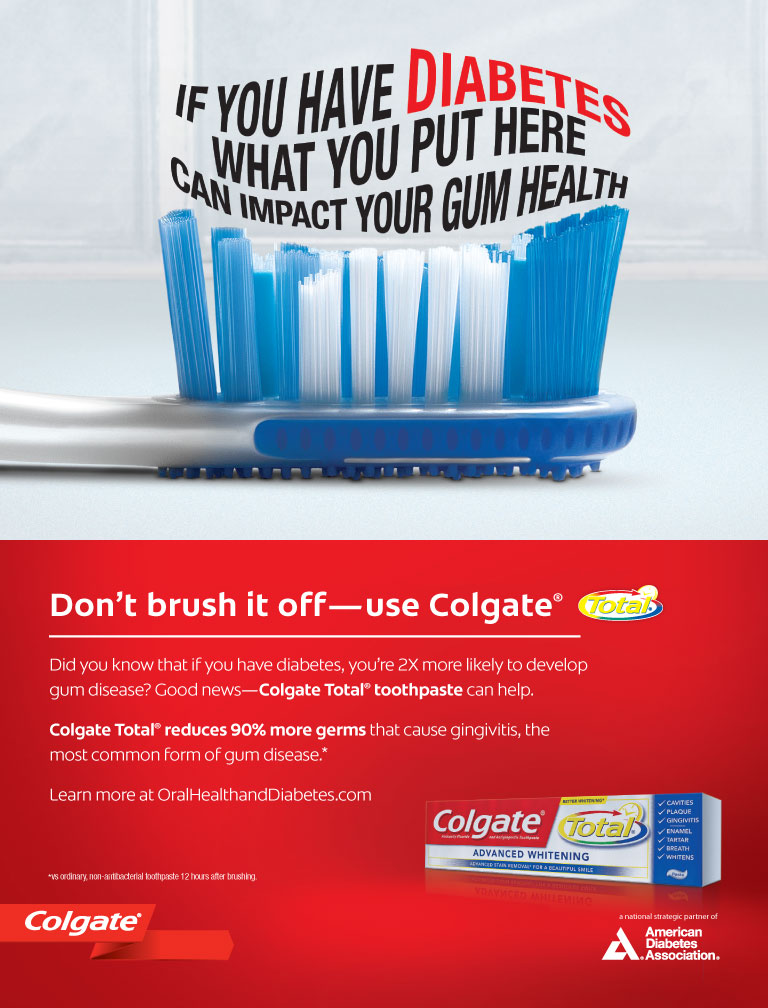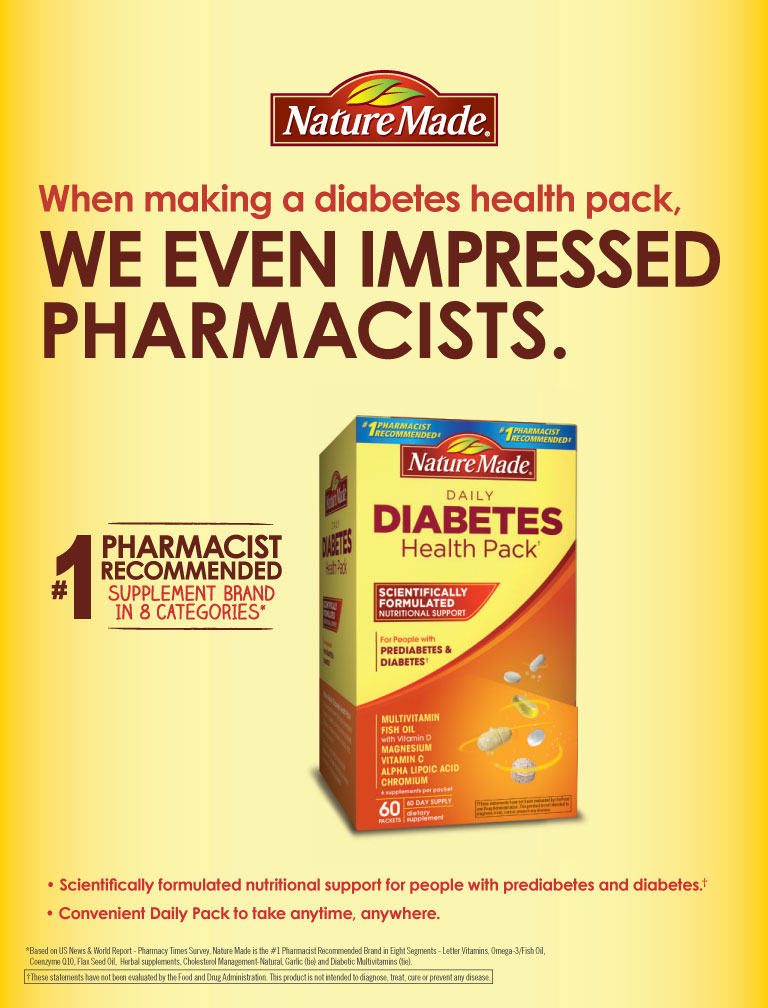
By Robert Ehrman, MD If you have diabetes, you probably know that you are at an increased risk for problems with your eyes, feet, skin?and nervous system. Did you know that diabetes can also cause problems in your mouth? Take Care Of Your Teeth Poor blood glucose control lets bacteria grow easily in your mouth. Having lots of bacteria in your mouth lead to?plaque buildup on your teeth. When this happens, your gums begin to pull away from your teeth, and pockets form between your teeth and gums. These pockets can become filled with germs and small bits of food. The gums then become inflamed and may bleed when you eat or brush your teeth. This condition is called “gingivitis”. Keeping your gums healthy is important because they help to hold your teeth in place. If nothing is done, you can get an infection in your gums that can go on to destroy the bone around your teeth, and they may start to move. Your teeth may fall out or need to be pulled. A recent study at the University of Copenhagen in Denmark looked at the link between oral health and diabetes. The study found that people with good oral health practices, along with a healthy diet and good stress management, had?lower blood glucose levels and healthier teeth and gums. Diabetes: A Major Cause Of Gum Disease There are many causes of gum disease, including smoking, hormonal changes, and certain cancers. Some medicines can?make your mouth dry, which can increase your risk for tooth and gum problems. This is because saliva helps slow the growth of bacteria and keeps your mouth healthy overall. Poorly controlled diabetes can also lead to gum disease. High levels of sugar in saliva make it easy for bacteria to grow there. This is why poorly controlled diabetes is a risk factor for gum disease. Also, diabetes can cause problems with blood flow to your teeth and gums. This makes it harder to repair damage to your gums and fight infection. It is also important to understand that if you develop gum disease from poor oral habits or other reasons, this could make it harder for you to control your diabetes. Other oral problems related to diabetes include: Thrush: this is an infection caused by a fungus that grows in the mouth and throat Dry mouth: this can cause soreness, ulcers, infections and cavities Dental Check-ups Are Important It’s important that you tell your dentist if you have diabetes, and keep them informed of any changes in your condition or medicines. Postpone any non-emergency dental procedures if your blood sugar is not well controlled. What Can You Do To Keep Your Mouth Healthy? The most important thing you can do is control your blood glucose levels. Have dental check-ups every six months?if possible. Avoid smoking and, if you wear dentures, remove and clean them every day. Good blood glucose control can also help prevent or relieve the dry mouth diabetes can cause. Here are some simple tips for a healthy mouth: Keep your blood glucose level under control Brush and floss every day Visit your dentist at least every 6 months. Be sure to tell them that you have diabetes Tell your dentist if your dentures do not fit right, or if your gums are sore Stop smoking. Your healthcare provider or dentist can tell you about what options there are to help you quit Call your dentist if you notice a problem. Take time to check your mouth regularly for any problems. If your gums bleed when you brush or floss, or if you notice dryness, soreness, white patches, or a bad taste in your mouth, contact your dentist right away. Remember, good blood glucose control can help keep your mouth happy and healthy for years to come. 6 Signs Of Gum Disease Red or swollen gums Gums that bleed easily when brushing or flossing Receding gums (pulling away from teeth) Loose teeth, making it hard to bite and chew Constant bad breath Dentures that don’t fit anymore
The post Oral Health And Diabetes appeared first on Spring 2017 Issue | CDiabetes Online Magazine.
]]>
By Robert Ehrman, MD
If you have diabetes, you probably know that you are at an increased risk for problems with your eyes, feet, skin?and nervous system. Did you know that diabetes can also cause problems in your mouth?
Take Care Of Your Teeth
Poor blood glucose control lets bacteria grow easily in your mouth. Having lots of bacteria in your mouth lead to?plaque buildup on your teeth. When this happens, your gums begin to pull away from your teeth, and pockets form between your teeth and gums. These pockets can become filled with germs and small bits of food. The gums then become inflamed and may bleed when you eat or brush your teeth. This condition is called “gingivitis”.
Keeping your gums healthy is important because they help to hold your teeth in place. If nothing is done, you can get an infection in your gums that can go on to destroy the bone around your teeth, and they may start to move. Your teeth may fall out or need to be pulled.
A recent study at the University of Copenhagen in Denmark looked at the link between oral health and diabetes. The study found that people with good oral health practices, along with a healthy diet and good stress management, had?lower blood glucose levels and healthier teeth and gums.
Diabetes: A Major Cause Of Gum Disease
There are many causes of gum disease, including smoking, hormonal changes, and certain cancers. Some medicines can?make your mouth dry, which can increase your risk for tooth and gum problems. This is because saliva helps slow the growth of bacteria and keeps your mouth healthy overall. Poorly controlled diabetes can also lead to gum disease.
High levels of sugar in saliva make it easy for bacteria to grow there. This is why poorly controlled diabetes is a risk factor for gum disease. Also, diabetes can cause problems with blood flow to your teeth and gums. This makes it harder to repair damage to your gums and fight infection. It is also important to understand that if you develop gum disease from poor oral habits or other reasons, this could make it harder for you to control your diabetes.
Other oral problems related to diabetes include:
- Thrush: this is an infection caused by a fungus that grows in the mouth and throat
- Dry mouth: this can cause soreness, ulcers, infections and cavities
Dental Check-ups Are Important
It’s important that you tell your dentist if you have diabetes, and keep them informed of any changes in your condition or medicines. Postpone any non-emergency dental procedures if your blood sugar is not well controlled.
What Can You Do To Keep Your Mouth Healthy?
The most important thing you can do is control your blood glucose levels. Have dental check-ups every six months?if possible. Avoid smoking and, if you wear dentures, remove and clean them every day. Good blood glucose control can also help prevent or relieve the dry mouth diabetes can cause.
Here are some simple tips for a healthy mouth:
- Keep your blood glucose level under control
- Brush and floss every day
- Visit your dentist at least every 6 months. Be sure to tell them that you have diabetes
- Tell your dentist if your dentures do not fit right, or if your gums are sore
- Stop smoking. Your healthcare provider or dentist can tell you about what options there are to help you quit
- Call your dentist if you notice a problem.
Take time to check your mouth regularly for any problems. If your gums bleed when you brush or floss, or if you notice dryness, soreness, white patches, or a bad taste in your mouth, contact your dentist right away. Remember, good blood glucose control can help keep your mouth happy and healthy for years to come.
6 Signs Of Gum Disease
- Red or swollen gums
- Gums that bleed easily when brushing or flossing
- Receding gums (pulling away from teeth)
- Loose teeth, making it hard to bite and chew
- Constant bad breath
- Dentures that don’t fit anymore
The post Oral Health And Diabetes appeared first on Spring 2017 Issue | CDiabetes Online Magazine.
]]>
By Robert Ehrman, MD ? Reviewed by Fran Daniel, MPH First, it is important to note that eating a variety of whole foods is a better choice for staying healthy than relying on vitamins or supplements.?Eating lean meats, vegetables, fruits, and whole grains- and limiting fats and sugar — are important for keeping your blood glucose under control. Individual foods can give you many different vitamins, minerals, and nutrients, in one?serving. For example, raspberries contain vitamin C, fiber, and antioxidants. These nutrients, plus all?the food nutrients we have not yet discovered, work?together in your body to ensure that you benefit from all of them. Using vitamins or supplements – which do not have the full range of nutrients that whole foods do — may not?be needed unless you have a specific vitamin deficiency. (“Deficiency” means that your body does not have enough?of an important nutrient.) It’s a good idea to talk to your healthcare provider before taking any vitamin supplements to see if you really need them. Your healthcare provider may want you to take?vitamin supplements if you are: On a low-calorie diet and do?not eat a wide variety of foods On a vegan diet (no meat, fish, eggs or dairy products) Pregnant On a restricted diet because you?have food allergies, kidney disease?or have trouble absorbing nutrients What Vitamins Are The Best? Many people, including those with diabetes, may?need to take vitamin D supplements.?Experts say to take 400 international units (IU) each day. Recent studies suggest that this may not be enough vitamin D. Ask your healthcare provider if you ?should take vitamin D supplements,?and how much to take every day. Why Is Vitamin D So Important For Good Health? Vitamin D might be able to: improve pain and tingling in your legs, feet, hands, and fingers. keep bones healthy and strong help with blood glucose control help ease depression in women with type 2 diabetes. How Can I Get More Vitamin D? Go outside in the sunshine. Sunshine is a great way to get vitamin D. To be safe, first check with your healthcare provider to make sure it’s safe for you to spend time in the sun. Eat more fish and egg yolks. Eat cereals with vitamin D added. Drink milk with vitamin D added. Take Vitamin D supplements if your healthcare provider recommends it. Vitamin D and calcium work together. Ask your healthcare provider if it’s a good idea for you to take Vitamin D with a calcium supplement. What about Chromium, and Vitamins C and E? There are some studies showing that these nutrients might be helpful for blood glucose control or heart health, but more research is needed. News stories over the past few years have reported that chromium might decrease body fat and build muscle without you having to change your eating habits. But, studies have not shown that chromium helps you lose weight. Also, it is not known how much chromium you should take. Fortunately, it is relatively safe. In fact, many healthcare providers tell their patients with diabetes to take chromium supplements. However, don’t take a chromium supplement without first talking with your healthcare team and knowing the correct amount to take. You might damage your kidneys if you take too much chromium. Good food sources of chromium include whole grains, bran cereals, seafood, green beans, nuts, peanut butter, and potatoes. People with diabetes may have lower levels of vitamin C in their bodies. This may be because higher blood glucose levels keep vitamin C out of the body’s cells. In one study, people with type 2 diabetes who took 2,000 mg of Vitamin C every day showed improvement in blood glucose and fat levels. However, more studies need to be done to confirm the benefits for people with diabetes so ask your healthcare provider first before taking vitamin C supplements. Some studies say that vitamin E might help prevent health problems such as heart disease, eye problems and kidney damage. However, it’s too early to know if this is true. In addition, experts are not sure how much vitamin E you should take. Vitamin E amounts greater than 800 IU each chance of stroke in people with high blood pressure. Too much vitamin E can also keep medicines that prevent blood clots from working. If you want to take vitamin E, ask your healthcare provider first about the pros and cons and if you do decide to take vitamin E, do not take more than 200 Tips for Taking Supplements Pick supplements with no more than 100 to 150 percent of the daily value for the listed vitamins and minerals Women who have gone through menopause should choose a supplement without iron Choose a brand that has the USP seal on the package. A USP (U.S. Pharmacopeia) seal says the product has been tested for strength and purity Check expiration dates; do not use expired supplements Keep supplements in a cool, dry place, and out of reach of children.
The post Vitamins and Diabetes Care appeared first on Spring 2017 Issue | CDiabetes Online Magazine.
]]>
By Robert Ehrman, MD ? Reviewed by Fran Daniel, MPH
First, it is important to note that eating a variety of whole foods is a better choice for staying healthy than relying on vitamins or supplements.?Eating lean meats, vegetables, fruits, and whole grains- and limiting fats and sugar — are important for keeping your blood glucose under control.
Individual foods can give you many different vitamins, minerals, and nutrients, in one?serving. For example, raspberries contain vitamin C, fiber, and antioxidants. These nutrients, plus all?the food nutrients we have not yet discovered, work?together in your body to ensure that you benefit from all of them. Using vitamins or supplements – which do not have the full range of nutrients that whole foods do — may not?be needed unless you have a specific vitamin deficiency. (“Deficiency” means that your body does not have enough?of an important nutrient.) It’s a good idea to talk to your healthcare provider before taking any vitamin supplements to see if you really need them.
Your healthcare provider may want you to take?vitamin supplements if you are:
- On a low-calorie diet and do?not eat a wide variety of foods
- On a vegan diet (no meat, fish, eggs or dairy products)
- Pregnant
- On a restricted diet because you?have food allergies, kidney disease?or have trouble absorbing nutrients
What Vitamins Are The Best?
Many people, including those with diabetes, may?need to take vitamin D supplements.?Experts say to take 400 international units (IU) each day. Recent studies suggest that this may not be enough vitamin D. Ask your healthcare provider if you ?should take vitamin D supplements,?and how much to take every day.
Why Is Vitamin D So Important For Good Health?
Vitamin D might be able to:
- improve pain and tingling in your legs, feet, hands, and fingers.
- keep bones healthy and strong
- help with blood glucose control
- help ease depression in women with type 2 diabetes.
How Can I Get More Vitamin D?
-
Go outside in the sunshine. Sunshine is a great way to get vitamin D. To be safe, first check with your healthcare provider to make sure it’s safe for you to spend time in the sun.
- Eat more fish and egg yolks.
- Eat cereals with vitamin D added.
- Drink milk with vitamin D added.
- Take Vitamin D supplements if your healthcare provider recommends it.
- Vitamin D and calcium work together. Ask your healthcare provider if it’s a good idea for you to take Vitamin D with a calcium supplement.
What about Chromium, and Vitamins C and E?
There are some studies showing that these nutrients might be helpful for blood glucose control or heart health, but more research is needed. News stories over the past few years have reported that chromium might decrease body fat and build muscle without you having to change your eating habits. But, studies have not shown that chromium helps you lose weight. Also, it is not known how much chromium you should take. Fortunately, it is relatively safe. In fact, many healthcare providers tell their patients with diabetes to take chromium supplements. However, don’t take a chromium supplement without first talking with your healthcare team and knowing the correct amount to take. You might damage your kidneys if you take too much chromium. Good food sources of chromium include whole grains, bran cereals, seafood, green beans, nuts, peanut butter, and potatoes.
People with diabetes may have lower levels of vitamin C in their bodies. This may be because higher blood glucose levels keep vitamin C out of the body’s cells. In one study, people with type 2 diabetes who took 2,000 mg of Vitamin C every day showed improvement in blood glucose and fat levels. However, more studies need to be done to confirm the benefits for people with diabetes so ask your healthcare provider first before taking vitamin C supplements. Some studies say that vitamin E might help prevent health problems such as heart disease, eye problems and kidney damage. However, it’s too early to know if this is true. In addition, experts are not sure how much vitamin E you should take. Vitamin E amounts greater than 800 IU each chance of stroke in people with high blood pressure. Too much vitamin E can also keep medicines that prevent blood clots from working. If you want to take vitamin E, ask your healthcare provider first about the pros and cons and if you do decide to take vitamin E, do not take more than 200
Tips for Taking Supplements
- Pick supplements with no more than 100 to 150 percent of the daily value for the listed vitamins and minerals
- Women who have gone through menopause should choose a supplement without iron
- Choose a brand that has the USP seal on the package. A USP (U.S. Pharmacopeia) seal says the product has been tested for strength and purity
- Check expiration dates; do not use expired supplements
- Keep supplements in a cool, dry place, and out of reach of children.
The post Vitamins and Diabetes Care appeared first on Spring 2017 Issue | CDiabetes Online Magazine.
]]>
